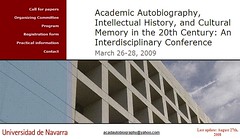Having an affection for scientific biography/autobiography, I was thinking of how I could possibly engage with the conference ‘Academic Autobiography, Intellectual History, and Cultural Memory in the 20th Century’ to be held 26-28 March, 2009 at Universidad de Navarra in Spain.
 The aim of the meeting is to engage with current discussions among historians, literary critics, anthropologists, sociologists, etc. about how intellectual history and cultural memory may be developed, articulated, and promoted through autobiography. In other words, the organizers emphasise themes like
The aim of the meeting is to engage with current discussions among historians, literary critics, anthropologists, sociologists, etc. about how intellectual history and cultural memory may be developed, articulated, and promoted through autobiography. In other words, the organizers emphasise themes like
- the academic as author/historian
- academic life writing as history or cultural discourse
- academic autobiography as intellectual history
- life writing and the definitions of academic disciplines
- the intersection between private and public lives in academic autobiographies
- academic autobiography as a literary or historical genre
- the ways in which the notion of literary or historical discourse may be rethought in the context of this form of writing
- the ways academic autobiographies challenge our notions of historiography or literary analysis.
The limitaton to the 20th century is fine. But what about the organizers’ understanding of what counts as ‘academic autobiography’? Humanities and social science scholars like historian Eric Hobsbawm, anthropologist Clifford Geertz, cultural critic Edward Said and others are mentioned, but scientists are apparenty not thought of as ‘academics’ in this context.
Yet the genre of scientific autobiography has a long and interesting history (also in the 20th century), which could be drawn upon for qualifying the discussion. Just think about how James D. Watson’s first autobiography, The Double Helix (1968) has changed contemporary perceptions of the life sciences! Its cultural impact led to it being ranked among the top ten titles on Modern Library’s 1998 list of best 20th century non-fiction books together with classics like Rachel Carson’s Silent Spring and John Maynard Keynes’ General Theory of Employment, Interest and Money. (Watson’s second autobiography, Avoid Boring People [2007; review here] hasn’t made it to any list yet, though).
How would studies of scientific autobiography add to the conference theme? In many ways scientific autobiography is not much different from literary or political autobiography. Except in one crucial way, namely that the author’s understanding of self in terms of science may influence his/her understanding of what it means to write an autobiography.
Biotech maverick Craig Venter recently employed this autobiographical trope in A Life Decoded (review here). He claimed that he saw his life narrative as the result of a genome that writes reflexively about itself. It wasn’t very convincingly done, and at first I dismissed the idea as terribly naïve. But thinking about it again, I believe he points to an interesting space for future self-writing.
As the postgenomic worldview — and especially the results of molecular neuroscience — is spreading in our culture (at least the secular part of it; religiously based cultures are probably immune), more and more people will probably understand their selves as complex biological systems, as intricate protein-protein interaction and metabolic machines. To think about oneself as a bundle of biomolecular reactions may, I suggest, become a pervasive existential motif in future autobiographical narratives. Michel Houellebecq has already played with similar ideas in The Possibility of an Island (see here).
I don’t think it’s as far-fetched as it immediately sounds. Freudian understandings of the self became an immensely influential trope in biographical and autobiographical writing in the first half of the 20th century. The explanatory power of postgenomic, molecular neuroscience may become equally influentual for the understanding of self in autobiographical writing. Venter’s attempt wasn’t convincing, but other and better attempts will hopefully follow.
Anyway, I probably won’t have time to send something in — they want a 500-word abstract before 15 October. More info about the conference here.
